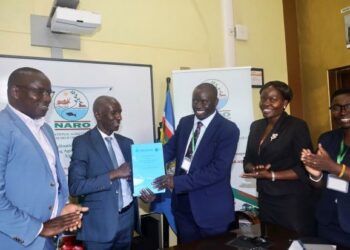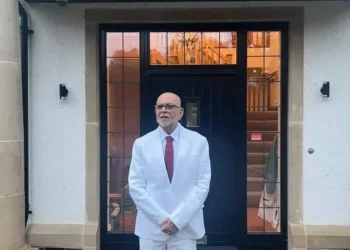Dfcu Bank has kicked out law firm Sebalu & Lule Advocates in a law suit filed by Meera Investments Limited, a real estate firm owned by businessman Sudhir Ruparelia, which seeks to cancel titled properties that were being used by Crane Bank and illegally transferred to the former on advice of the law firm.
In a November 20 notice of change of advocates, law firm Kalenge, Bwanika, Ssewa & Co. Advocates says it has been instructed by dfcu Bank, to represent them against a law suit.
“We have been instructed by DFCU to represent it in the above proceedings in place of Sebalu & Lule advocates. We request that all further correspondences and or court process in connection thereto be forwarded to us,” a notice by the new law firm reads.
The development comes as another big blow to Sebalu &Lule having been kicked out of a commercial case by Bank of Uganda against property mogul Sudhir early this year.
In his April 30 ruling, Justice Paul Gadenya Wolimbwa, kicked Sebalu & Lule Advocates out of any commercial disputes involving, Mr. Sudhir and his Crane Management Services because “the Applicant has made out a case that the first respondent (Sebalu & Lule) has relevant information of the applicant. The information is relevant and I accordingly grant an injunction restraining the first respondent from handling any case involving the applicant”.
In October this year, Bank of Uganda confirmed that dfcu would be returning the 48 properties acquired from Meera Investments Limited.
Dfcu has been operating its business in buildings/properties belonging to Meera Investments Limited since it acquired Crane Bank Limited in January 2017. But Sudhir has been challenging the transfer of these properties to dfcu which took over Crane Bank.
In its annual report 2018/2019, the Central Bank revealed that on September 12, 2019, dfcu told them about its decision to exercise its options to rescind its interest in purchasing the 48 properties pursuant to clause 8.7 of the agreement.
“As part of rescinding of the purchase , dfcu will return to Bank of Uganda Certificates of title for Meera Investments Limited properties and requires Bank of Uganda to pay dfcu the net book value of the properties recorded in the assets and inventory compilation report as at October 20, 2016,” BoU stated.
Early this month, dfcu denied claims that it was closing some of its branches across the country. Media reports had alleged that the commercial bank was in a move to close 22 of its branches starting October 14, 2019.
In a statement, dfcu said, “The Bank wishes to clarify that the purported notice in respect to branch closures is false and did not originate from dfcu Bank.”
The bank which has a network of 63 branches across the country further revealed that they are in the process of implementing their digital strategy to drive better customer experience, improve efficiency and align their operations with emerging trends in the financial sector.
However what remained a fact was that dfcu was considering vacating 22 buildings of Sudhir’s 48 properties.
The development comes hot on the heels of High Court Commercial Division ruling in favour of the property mogul in a Shs397 billion lawsuit that was filed by the central bank against him in the aftermath of the closure of Crane Bank.
In his ruling, Justice David Wangutusi stated that BoU/Crane Bank (in receivership) did not have a legal basis to sue Sudhir, the owner of Crane Bank, then the second biggest bank in Uganda.
Court ordered Bank of Uganda to pay Sudhir’s legal costs.
BoU /Crane Bank in Receivership sued the property mogul and Meera Investments Limited for allegedly fleecing the defunct Crane Bank Limited (CBL) of Shs397 billion that the central bank wanted refunded.
Sudhir denied the allegation and has since counter-sued BoU, seeking compensation of $8m (Shs28 billion) in damages for breach of contract.
Law firm Sebalu& Lule Advocates misled dfcu:
A city law firm Sebalu & Lule Advocates misled dfcu bank to illegally transfer the leasehold titles that belong to Meera Investment Limited.
In a leaked memo, the law firm offered legal advice to the commercial bank informing it to go ahead and transfer into its name, the 46 properties it acquired in the controversial takeover of Crane Bank.
Between 2012 and 2016, Meera leased the 46 properties to Crane Bank on different terms with the leases being duly registered as encumbrances on Meera’s freehold and mailo interest.
The lease titles were subsequently processed and issued to Crane Bank.
Crane Bank agreed to pay $6,000 as ground rent for each of the properties effective on or before the January 1, of every year to the property owners (Meera Investments).
Meera had also agreed with Crane Bank under various lease agreements that in case of any breach, non-performance, or non-observance of what they had agreed on in the lease agreements, it will be lawful for Meera to seek legal redress from court.
“It was further agreed between the plaintiff [Lessor] and Crane Bank [Lessee] that anything done contrary to the terms of the lease agreements would forthwith cease the lessee’s rights or interest in the suit properties without prejudice to the lessor’s entitlement to rent unpaid and due,” Meera claims.
With the agreements in place, on October 20, 2016, BoU took over Crane Bank under statutory management.
On January 24, 2017 Bank of Uganda announced that it had transferred all the assets and liabilities of the bank to dfcu Bank.
Dfcu Bank, which was the new tenant then moved to take over the 46 properties, without the consent of the owners Meera Investments.
The document titled Transfer of former Crane Bank household properties, dated May 8, 2017, “the law firm skipped important aspects of the law including the fact that banks are not allowed to invest in business for fear of conflict of interest with their clients, apart from their main premises” banking analysts say.
“In light of the lengthy of time between the completion of date and when dfcu can vividly exercise the option to rescind the purchase of household properties, our recommendations is that the transfer be registered immediately,” reads an excerpt from the leaked document.
Sebalu & Lule told dfcu that “our opinion is that although the proposed approach of registering caveats provides dfcu with some level of legal protection , its indisputable title to the leasehold properties can only be guaranteed through registration of the transfers executed by BoU in favour of dfcu.”
The lawyers also said 24 months was too long a time to wait, for BoU to resolve ownership issues.
Do you have a story in your community or an opinion to share with us: Email us at editorial@watchdoguganda.com











